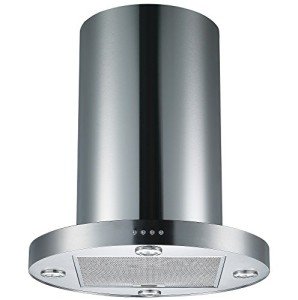5 Killer Quora Answers To Extractor Fan Kitchen Island
페이지 정보
작성자 Myron 작성일 25-05-18 13:24 조회 50 댓글 0본문

Island Hoods: An Overview of Their Purpose, Styles, and Benefits
Island hoods have actually ended up being a popular choice in modern-day kitchen design, extractor fan kitchen Island serving both practical and aesthetic functions. As the focal point of numerous kitchens, these flexible ventilation systems not only help eliminate smoke, smells, and heat but also enhance the total ambiance of the area. This short article dives into the different kinds of island hoods, their benefits, setup factors to consider, and upkeep requirements.
What is an Island Hood?
An island hood is a kind of range hood that is suspended above a kitchen island, typically where a cooktop lies. Unlike wall-mounted range hoods that are connected to a wall, island hoods are created to be installed from the ceiling, permitting for a streamlined, inconspicuous appearance while supplying reliable ventilation.
Advantages of Island Hoods
Island hoods include several advantages that elevate both the performance and aesthetics of a extractor fan kitchen island. Here are some crucial benefits:
1. Improved Ventilation
Island hoods stand out at successfully recording smoke, steam, and airborne grease created while cooking. They guarantee that the kitchen remains fresh and devoid of undesirable odors.
2. Aesthetic Appeal
Offered in numerous styles, colors, and products, Extractor Fan kitchen island island hoods function as a focal point in the kitchen. They can complement the total design theme, including visual interest and beauty.
3. Variety of Designs
Island hoods are offered in numerous styles, from traditional to contemporary, allowing house owners to choose one that matches their taste and extractor fan kitchen island design.
4. Boosted Cooking Environment
By getting rid of excess heat and humidity, island hoods produce a more comfortable cooking space.
5. Increased Home Value
Upgrading to a modern-day island hood can include worth to a home, attracting possible buyers who prioritize kitchen aesthetic appeals and performance.
Types of Island Hoods
Island hoods are available in different designs and performances. Here are some popular types:
| Type of island chimney hood Hood | Description | Pros | Cons |
|---|---|---|---|
| Ducted | Ventilation system linked to external ducting. | Effective air removal; suitable for heavy cooking. | Setup can be complicated; requires ductwork. |
| Ductless | Utilizes charcoal filters to tidy and recirculate air. | Much easier to set up; no external venting needed. | Less efficient extractor fans for kitchen islands heavy cooking; needs regular filter replacement. |
| Wall-Mounted | Mounted on a wall; can be used in an island cooker hood with a cooktop against a wall. | Versatile; can fit various kitchen layouts. | Minimal to cooktops against walls. |
| Downdraft | A retractable system that increases from behind the cooktop. | Space-saving design; discreet when not in use. | Less reliable than conventional hoods for ventilation. |
Setup Considerations
Choosing and installing an island hood involves several crucial factors, including:
Ceiling Height: Ensure the hood is set up at the appropriate height. Generally, there should be between 30 to 36 inches above the cooktop.
Ducting vs. Ductless: Decide whether a ducted or ductless system is preferable based on the kitchen design and construction.
Ventilation Power: Measure the BTU (British Thermal Units) produced by the cooktop or range to identify the needed CFM (cubic feet per minute) for correct ventilation. As a general guideline:
- 300 CFMs for electrical cooktops.
- 600 CFMs for gas cooktops.
Design and Size: Choose a design and size that complements the kitchen's general visual while guaranteeing it has the power to handle your cooking needs.
Electrical Requirements: Ensure that setup abides by local building codes, especially relating to electrical and gas lines.
Maintenance of Island Hoods
Appropriate maintenance of island hoods is necessary for ensuring efficient operation and longevity. Here are some upkeep suggestions:
Regular Cleaning: Clean the outside and interior surface areas regularly to prevent grease accumulation. Use proper cleaners based on the hood's material (stainless-steel, glass, and so on).
Filter Replacement: For ductless hoods, replace charcoal filters every 3 to 6 months. Metal filters must be cleaned up every few weeks, depending on use.
Examine Ductwork: For ducted hoods, regularly inspect the ductwork for any obstructions to preserve airflow efficiency.
Expert Servicing: Consider having an expert inspect and service the hood every year to guarantee optimal efficiency.
Frequently asked questions
1. Are ducted or ductless island hoods better?
Each type has its advantages. Ducted hoods are more effective for heavy cooking as they vent air exterior, while ductless hoods are simpler to install and can work well in areas without external ventilation options.
2. What is the ideal height for installing an island hood?
The ideal height for mounting an island hood is normally between 30 to 36 inches above the cooking surface area to ensure optimum performance and safety.
3. Do island hoods require expert setup?
While some house owners may pick to install island hoods themselves, employing a professional is recommended, particularly for ducted models that need specialized installation.
4. How frequently do I need to clean the filters?
It is advisable to tidy metal filters every 1-2 months and change charcoal filters in ductless hoods every 3-6 months, depending on use.

5. Can an island hood enhance home value?
Yes, setting up a contemporary and trendy island hood can enhance the kitchen's appeal, potentially increasing the total value of the home.
Island hoods use a special combination of performance and design, making them an appealing option for modern cooking areas. Comprehending their types, advantages, setup factors to consider, and upkeep requirements can help property owners make notified choices. With correct care, an island extractors hood can act as both a vital device and a gorgeous focal point in any kitchen space.









